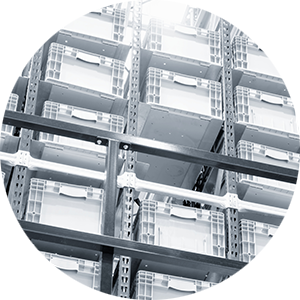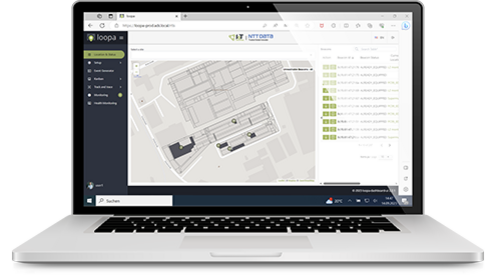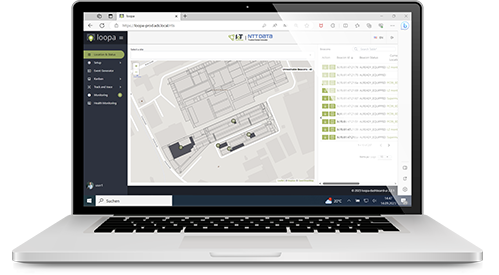
Digitalisieren Sie Ihre SAP Prozesse in Lager und Produktion
Digitalisierung
Sie möchten in Zeiten von IoT wettbewerbsfähig bleiben? Erfassen Sie Ihre Warenbewegungen in Echtzeit und verbuchen Sie diese automatisch in SAP. Behalten Sie den Überblick über Ihre Assets und Shopfloor-Bewegungen digital und in Echtzeit. Sparen Sie sich das Ausdrucken von Kanban-Karten, Transport- und Fertigungsaufträgen.

Eliminieren Sie Ineffizienzen und Fehler in Ihrer Materialversorgung
Prozesssicherheit
Sie möchten Sich zu jeder Zeit darauf verlassen können, dass im Lager und der Produktion alles rund läuft, Ihre Bestände stimmen und es zu keinen Unterbrechungen Ihrer Prozesse kommt? Stellen Sie sicher, dass Ihre Lieferkette nicht unterbrochen wird und reduzieren Sie die Ihre Durchlaufzeiten, indem Sie Lager- und Produktionsprozesse vollständig aus SAP abbildbar gestalten. Umgehen Sie Probleme und Konsequenzen die durch fehlerhafte manuelle Buchungen verursacht werden.

Behalten Sie den Überblick über Ihre Shopfloor-Bewegungen
Transparenz
Sie möchten zu jedem Zeitpunkt wissen, in welchem Arbeitsschritt sich Ihre Kanban-Behälter und Materialien für die Fertigung befinden? Verbessern Sie Kommissionierzeiten für Kundenaufträge. Schaffen Sie nicht wertschöpfende Tätigkeiten wie das Suchen nach Assets und wiederholte manuelle Prüfen auf Nachfüllbestand für Mitarbeitende im Lager ab. Gestalten Sie Ihre Warenbuchungen und Shopfloor-Bewegungen komplett transparent.

Eine innovative end-to-end-Lösung zugeschnitten auf Ihre Herausforderungen
Entdecken Sie, wie loopa sowohl Hardware als auch Software nutzt, um Warenbewegungen in Echtzeit zu erfassen und automatisch in Ihrem SAP-System zu verbuchen. Mit loopa wird die vollständige digitale Abbildung Ihrer Lager- und Produktionsprozesse möglich. Verlässliche Soft- und Hardware sowie ein integriertes Dashboard mit einer Vielzahl an Modulen und Funktionen, um Ihre Prozesse zu visualisieren, zu analysieren und zu optimieren.

Reibungslose SAP-Integration
Eins mit SAP
Unsere end-to-end-Lösung ist ausgezeichnet durch eine durchgehend reibungslose Integration in Ihr SAP-System. So ermöglicht die automatische Positions- und Statusdatenverbuchung entlang der Produktions- und Logistikprozesse eine flexible Abbildung Ihrer Use Cases wie Pick-by.Light-Kommissionierung und Track & Trace in Lager und Produktion.

Intuitive Benutzeroberfläche
Intuitiv. Einfach. Effizient.
Entdecken Sie Echtzeit-Tracking neu. Mit loopa können Sie jederzeit zuverlässige Echtzeit-Aussagen über Material- & Güterpositionen in Ihrem Lager und Ihrer Produktion treffen. Nutzen Sie das intuitiv gestaltete loopa.Dashboard, um Ladungsträger und Handling-Units zu lokalisieren und eliminieren Sie somit Suchzeiten bei Ihren Mitarbeitenden.

Leistungsfähige Hardware
Unsere Hardware, Ihr Wettbewerbsvorteil
Durch das Zusammenspiel unserer Hardware-Komponenten wie dem loopa.Beacon und loopa.Locator entsteht eine vollumfängliche Lösung, die durch ihren Einsatz im Lager die Qualität Ihrer Betriebsabläufe erhöht und nicht nur Zeit sondern auch Kosten spart. Durch die nahtlose Integration von loopa in Ihr SAP-System, und der damit einhergehenden Automatisierung Ihrer Kommissionier- und Fertigungsprozesse, vermeiden Sie Buchungsfehler und stellen sicher, dass Materialauslieferungen korrekt und pünktlich erfolgen.
- Integriertes LCD-Display zur Darstellung von Informationen oder QR-Codes
- Drei (3) unterschiedlich farbige LED’s (gelb/grün/rot) zur optischen Auffindbarkeit oder definierten Statusanzeige
- Physischer Drucktaster unterhalb des Displays, der je nach Kundenwunsch belegt werden kann (bspw. um einen bestimmten Vorgang zu bestätigen)
- Temperatur- und Beschleunigungssensor
- Zum einen werden technische Probleme über das Dashboard visualisiert und können in der Regel schnell und selbständig von Kundenseite identifiziert und gelöst werden. Darüber hinaus steht unser Kundenservice für schwerwiegende Probleme immer zur Verfügung, sodass das System so schnell wie möglich wieder fehlerfrei läuft.





